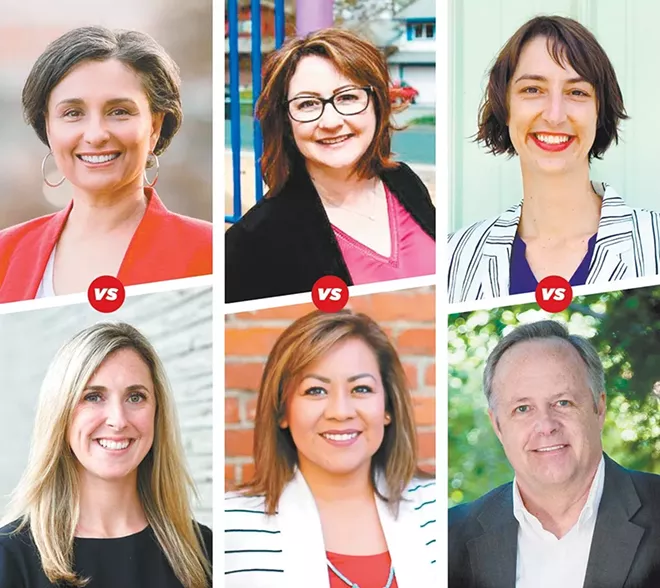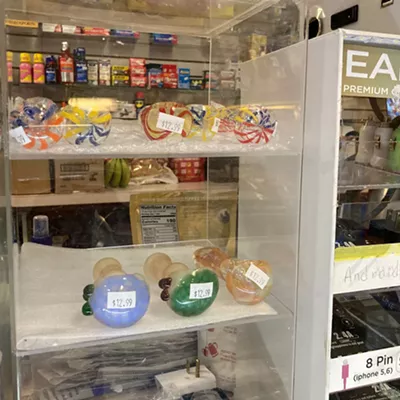
And even then, there are some qualifications. The president is authorized to talk about "actions which have been taken," but should avoid speculating on decisions that haven't happened yet. Over the years, reporters from the Inlander and other local media outlets have tried and mostly failed to speak to a school board member other than the president.
This kind of policy is virtually unheard of in other institutions. Members of Spokane City Council, Spokane Valley City Council, the Spokane County Board of Commissioners and the state Legislature all individually speak to the media, as is standard for most elected officials. Can you imagine liberal Spokane City Council President Ben Stuckart speaking for the sole conservative member of City Council, Mike Fagan?
For school boards, it's not totally out of the ordinary for only the board president to speak to the media, though it's rarer to have it written in policy. Central Valley and East Valley have a practice of only the board chair speaking to reporters. West Valley School District usually has the board chair speak, but it depends on the topic. But in Seattle Public Schools, reporters are able to regularly interview every school board member.
Sue Chapin, the current Spokane school board president, says there's a reason only she can speak to the media.
"The purpose is to assure that decisions the board has made are represented by a single voice," Chapin says. "Since all of our discussions before a decision occur in open public meetings, the media always has the opportunity to hear individual members' thoughts and opinions on the topics being discussed before decisions are made."
But the policy has irked community members at times. Paul Dillon, a local activist and a spokesman for Planned Parenthood of Greater Washington and Idaho, grew frustrated with the policy during Spokane's controversy over which sex education curriculum the school district would choose. Much of the work to choose the curriculum was done before it ever was up for discussion with the school board, and Dillon says not knowing where individual board members stood made the topic more controversial.
"It allowed a lot of people to project when nobody knew. It was all in the dark behind closed doors," Dillon says. "The fact that you voted for somebody and you can't get an idea on where they stand on an issue is ludicrous."
He thought it was strange that unelected district staff spoke more to the media than the school board itself.
"If you're in public office, you have an obligation to talk to the media," Dillon says.
Under the current policy, of course, the Inlander cannot ask board members other than Chapin if they agree. But we can ask the people who will soon be on the school board. The Spokane Public Schools Board of Directors will have three new faces chosen by voters (click here for their stances on other issues). So the Inlander asked each candidate: If you were elected, would you support letting each board member speak to the media?
Of all six candidates, only one, JENNY SLAGLE, was firmly against the policy. Slagle is on the district's diversity advisory council and is the director of tribal relations for the nonprofit Better Health Together.
"I think if we are expecting our board to be more diversified, I can't see that. I wouldn't want just one voice, because there's five of us," Slagle says. "I wouldn't agree with that and I would expect that we would change that."
Her opponent, KELLI MACFARLANE, a former teacher, says she "can't answer that right now." She's not going to go in and demand that the policy is changed, she says, but something could change down the road based on how the board members work together.
KEVIN MORRISON, running for Position 4 against ERIN GEORGEN, has a unique perspective on the issue. Morrison not long ago was the spokesman for Spokane Public Schools, the go-to call for any reporter looking for comment from the district on any issue.
Morrison says he's a "huge believer" in the First Amendment and a free and open press, but he says he'd be cautious. He says it might just come down to the relationship and trust he has with members of the media. While he's not opposed to individual members speaking, the current policy with only the president speaking — unless there's a huge divide — makes sense, he says.
"You don't see the sausage being made in most legislative bodies, you're not in there and seeing behind the closed doors," Morrison says. "I'm not sure the public needs to be aware of that. They need to be aware of the outcome and how it was reached in a reasonable way, and some of the issues that were considered, but if it gets down to the mudslinging... that comes out in the public vote."
Georgen says she understands the policy because it's important to make sure the right message is being delivered to the public. Still, she would want more transparency. She generally wouldn't restrict board members if they have a different view from the board president.
"I'm not afraid of people disagreeing on things," Georgen says. "I think it shows we're doing our job as the board if we let the community in on those discussions, as much as that makes sense to do."
NIKKI LOCKWOOD, a leader of the student advocacy group called Every Student Counts Alliance, says she would have to read the policy a little more. She appreciates the interest in hearing from each individual member, and she notes that members of Spokane City Council other than Stuckart frequently speak to the media.
"I don't know how we get around that," Lockwood says. "It's not the biggest concern I have, really."
Her opponent, former teacher KATEY TRELOAR, thinks only one school board member should talk to the media, but it doesn't have to be the president. It could be someone else comfortable with speaking to the media, and she says that person could be tasked with talking to the media a certain amount of times per week.
Having all five speak to the media, Treloar says, could lead to the public misinterpreting things.
"I think that it's important that — behind closed doors — the school board asks the really important questions and has those uncomfortable conversations," Treloar says. "It's also important to be a united front to the public. I think having one voice as a person that talks to the media is important."





















